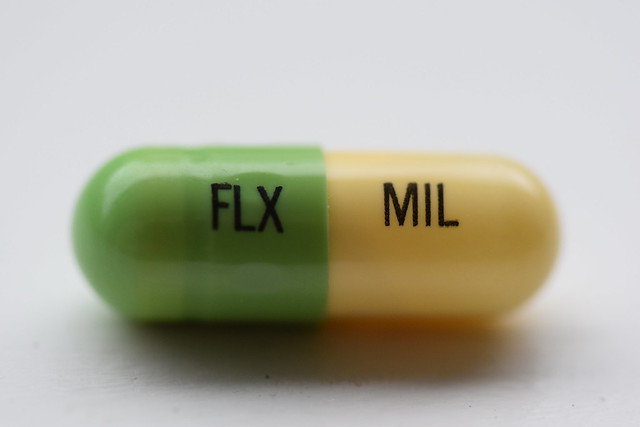A new study found no evidence that the addition of the antidepressant fluoxetine to Cognitive Behavioral Therapy (CBT) treatment improves depressive symptoms for youth diagnosed with moderate-to-severe Major Depressive Disorder (MDD). These findings, published in The Lancet Psychiatry, contradict guidelines recommending fluoxetine as the first-choice antidepressant for this age group.
The researchers, led by Christopher Davey, Michael Berk, and Patrick McGorry, write:
“The results have important implications for treatment. The study did not find evidence to support adding antidepressant medication to psychotherapy for the treatment of young people with moderate-to-severe depression.”

Given that antidepressants are commonly used to treat young people, the researchers set out to determine if adding fluoxetine to CBT improves depressive symptoms in this cohort. The effectiveness of combining CBT with antidepressants has been contested. One Cochrane Review concluded that there is insufficient evidence to recommend a combined treatment approach.
In addition, concerns about the safety of antidepressants in youth have mounted following the U.S. Food and Drug Administration’s (FDA) black box warning that antidepressants increase suicidal thoughts and behaviors. However, some studies have suggested that fluoxetine is the only antidepressant more effective than placebo in treating child and adolescent depression and may not carry the same safety risks.
In this multi-center study, Berk, McGorry, and team examined whether combined treatment of fluoxetine and CBT was more effective than treatment with placebo pills and CBT. Participants included 153 adolescents (aged 15-25 years) who were randomly assigned to take either fluoxetine (50%) or placebo (50%) in addition to weekly, 50-minute CBT sessions. Participants fit criteria for MDD, as defined by the DSM-IV.
This was a double-blind study meaning that neither participants, clinicians, nor research assistants were aware of which participants were assigned to placebo versus fluoxetine. Depression symptoms were primarily rated by interviewers using the Montgomery Asberg Depression Rating Scale (MADRS) at the 12-week mark.
Based on the results of this study, combined treatment with fluoxetine and CBT was no more effective for reducing depressive symptoms than placebo and CBT. Similarly, participant self-reports of depressive symptoms, measured by the Quick Inventory of Depression Symptomatology (QIDS) scale, also exhibited no evidence that the addition of fluoxetine was more helpful than placebo in reducing depressive symptoms. There were no significant differences in suicidal attempts and non-suicidal self-injury between groups.
However, the researchers share that, based on subgroup analyses, findings indicate that combined treatment “might be more effective for anxiety symptoms and for self-reported depressive symptoms in youth aged 18 years and older.” These findings were indicated by this age group’s comparative reductions in QIDS scores and some comparative reduction in MADRS scores.
They conclude:
“Our results did not provide evidence to support the addition of fluoxetine to CBT for further reducing depressive symptoms in young people with moderate-to-severe MDD. This finding is particularly so for patients younger than 18 years.”
**
The researchers included the following declaration of interest:
“Declaration of interests OMD has received grant support from the Brain and Behavior Foundation, National Health and Medical Research Council, Simons Autism Foundation, Stanley Medical Research Institute, Lilly, and ASBDD/Servier, and in-kind support from BioMedica Nutracuticals, NutritionCare and Bioceuticals. NK receives royalties from Guilford Publications, Inc, Springer Publishing, and Routledge Press (which includes royalties from books on the topics aligned with this research). MB has received research support from the Simons Autism Foundation, Stanley Medical Research Foundation, MBF, beyondblue, Rotary Health, Meat and Livestock Board, AstraZeneca, Woolworths, Avant and the Harry Windsor Foundation, and book royalties from Oxford University Press, Cambridge University Press, Springer Nature, and Allen and Unwin. He has been a speaker for AstraZeneca, Lundbeck, Merck, and Servier, and has served as a consultant to Allergan, AstraZeneca, Bioadvantex, Bionomics, Collaborative Medicinal Development, Grunbiotics, Janssen Cilag, LivaNova, Lundbeck, Merck, Mylan, Otsuka, and Servier. The other authors have no competing interests to declare.”
They also disclosed within the manuscript that “The funder of the study had no role in study design, data collection, data analysis, data interpretation, or writing of the report.”
****
Davey, C. G., Chanen, A. M., Hetrick, S. E., Cotton, S. M., Ratheesh, A., Amminger, G. P., … & Rice, S. (2019). The addition of fluoxetine to cognitive behavioural therapy for youth depression (YoDA-C): a randomized, double-blind, placebo-controlled, multicentre clinical trial. The Lancet Psychiatry. http://dx.doi.org/10.1016/ S2215-0366(19)30215-9 (Link)















Those “mental health” workers are always trying to claim the drugs know how old the person taking them is. They don’t, the antidepressants can harm people of all ages.
For example, “Antidepressants are crushing Americans’ sex drive: Millions say they were not warned the pills would affect their libido and ability to orgasm – but quitting can be agony,” were the findings of a recent survey.
https://www.dailymail.co.uk/health/article-7011837/Antidepressants-crushing-Americans-sex-drive-survey-finds.html
Is destroying a person’s sex life harming that person? Yes. Is putting a person on a drug that is “agony” to get off of harming a person? Yes. Do the psychiatrists admit the antidepressants have odd sexual side effects? No, they misdiagnose them instead. Which, of course, leads to even more – very profitable for the psychiatrist – harm.
Report comment
What does it mean – Fluoxetine? Why should this substance make people less depressed? Why are chemicals that have random effects called antidepressants, why not use unique plants for these purposes? Do doctors report high levels of toxicity and liver harm of such drugs? How can we seriously discuss this topic?
Report comment
Removed for moderation.
Report comment
If you used something like B complex 100’s for the placebo, it would likely run rings around the active substance.
Report comment
No effect, even when using MADRS?
“The Montgomery-Asberg Depression Rating Scale (MADRS) is a 10-item clinician-administered scale, designed to be particularly sensitive to antidepressant treatment effects in patients with major depression.”
From this: “Montgomery Asberg Depression Rating Scale”
Link: https://www.sciencedirect.com/topics/nursing-and-health-professions/montgomery-asberg-depression-rating-scale
…which contains an excerpt from this paywalled chapter:
“Diagnostic Rating Scales and Laboratory Tests”
By Joshua L. RoffmanM.D., Benjamin C. Silverman M.D., Theodore A.Stern M.D.
Link: https://www.sciencedirect.com/science/article/pii/B978143771927700008X
…which cites a study in support of the original claim. The study is the one that the creators of the MADRS wrote to introduce it to the world:
Montgomery SA, Asherg M: “A new depression scale designed to be sensitive to change” Br J Psychiatry 134:382-389, 1979.
That article is available for free, courtesy of one of the authors, on research gate. If don’t know if you have to join research gate to get it. It’s free.
https://www.researchgate.net/publication/224773098_A_New_Depression_Scale_Designed_to_be_Sensitive_to_Change
Report comment
Why would you need a test that’s more sensitive? Why would someone take drugs just to get a tiny bit better?
Report comment
Removed for moderation.
Report comment
So disturbing that #ineedmymedsmarianne was trending on twitter, when it doesn’t take much research to realize that no one has a good reason why these drugs “work,” and in fact, much evidence shows that a placebo would be just as good (without the nasty effects so often referred to as “side effects” and without the long term damage, too).
Report comment
Psychotherapy is a scam. No drugs, No therapy, no mental illness.
Report comment